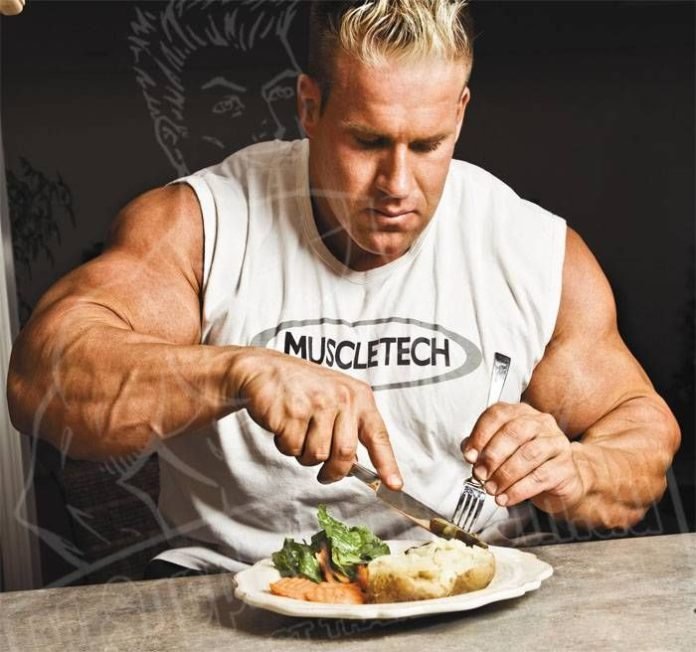You have read about Jay Cutler’s Olympia workout, but what about his diet?
In How I Won the 2006 Mr. Olympia, which was recently published in Flex magazine, Jay talks about his historic win and reveals his diet.
On his victory: “It’s just now starting to sink in that I’m on top of the world. It’s long overdue, but after years as runner-up, I feel great.
You try to think positively that it’s going to happen, but historically, Mr. Olympias are almost never dethroned – they retire first – and Ronnie Coleman was considered unbeatable.
I still believed I could do it. People thought I was crazy, but I did it. I made history.”
Jay Cutler’s Olympia Diet
- Meal 1: 1 pound of fish, cereal, white rice
- Meal 2: 1 pound of fish, white rice, Ezekiel (flourless) bread
- Meal 3: 20 egg whites, cereal, white rice
- Meal 4: 1 pound of fish, white rice, Ezekiel (flourless) bread
- Meal 5: 1 pound of fish
- Meal 6: 20 egg whites
- Meal 7: 1 pound of fish
Note: The last two weeks before the Mr. Olympia, Cutler substituted steak and chicken for two of the fish meals.
Cutler explains. “This year, I started my precontest prep at 12 weeks out, versus 18 weeks in 2005. Offseason, my diet had been leaner this year, so I didn’t need as much time to get into shape.
Because I was in such good offseason condition, I only had to struggle with my precontest diet for four weeks; even then, it was just a matter of manipulation, not regimentation.
I cut out food that I’d used in the past: oatmeal and protein powders, for example. For protein, I basically ate just fish and egg whites. My meat source was fish only, usually orange roughy.
Until two weeks out, I had no red meat and no chicken; from that point on, in order to get fuller, I added one chicken and one red-meat meal per day into my diet, replacing two of the fish meals.
I gained six pounds in four days just from adding more animal meats. My carbohydrate sources were white rice and a product I get at Whole Foods Market called Ezekiel, a flourless bread. There’s also an Ezekiel cereal, so that replaced my oatmeal.
With this baseline established, I ran one a seven-meal-a-day diet. From the start of me precontest period, I maintained a consistent daily intake of 350 grams of carbs and 500 g of protein, until my body caught up – until it stopped responding to the diet.
From then on, I’d have highs and lows for my carb intake, depending upon whether I needed more or less food. Toward the end, once I got lean, I ate high carbs of 600-1,000 g a day.
Breakfast was always pretty big – 120 g of carbs – and my first postworkout meal was always at least 100 g of carbs. The rest of the meals were around 50 g of carbs. For the last two or three meals, I’d have strictly protein.
Up until the final two weeks, I ate a pound of fish in five of the meals. For the other two meals, it was 20 egg whites each. I definitely ate more protein than in the past, and my body obviously responded to that: I started precontest at 287, and 10 days out, I was 290.
When I stepped onstage for finals night, I was 274, compared with 264 in 2005. In the past, I’d tell myself, OK, two weeks out, I’ll take it down, but you see so many guys look great two weeks out but end up10 to 15 pounds lighter than they should, so I did things in reverse:
I ate more and backed off the training volume, and stayed with cardiovascular training, which gave me a bigger harder look. When you have a lean body to start with, you can eat your way into a contest. That’s ideal for a bodybuilder; you’d rather eat yourself in than starve yourself in.
What no one knew until after the show was that I was on IVs for Thursday, Friday and Saturday the previous week because of a bacterial infection in my intestines, so my weight went from 290 to 270, and the thought was going through my mind that I wouldn’t make it to the contest.
I wasn’t going to mention this because people would count me out, but I was able to prop my weight back up. Ironically, that episode helped me condition – it made me get rid of water.
Consequently, though, my whole game plan had to change in the final week. I did no carb loading, no depletion; I didn’t have to do anything drastic. The diarrhea I suffered worked as a diuretic; that was how I dried out.”

